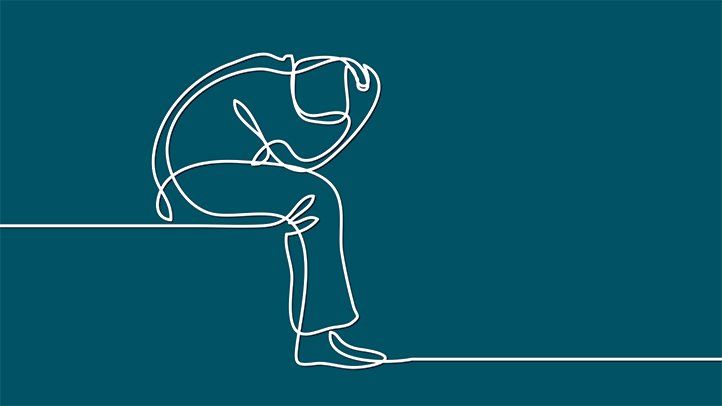We all know that feeling of stress. It can be caused by many different things, such as work, family problems, or money troubles. And while we may feel like it’s just a temporary problem, the physical effects of stress can actually do a lot of damage to our bodies if we don’t take steps to address them. In this blog post, we will discuss the physical effects of stress and what you can do to mitigate them. We’ll also provide some helpful tips for reducing stress in your life!
Contents
Defining Stress
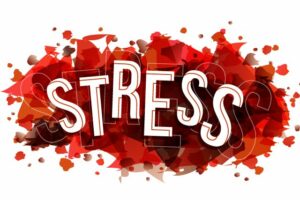 Stress is the body’s response to any demand placed upon it. When you perceive a threat, your body releases hormones that prepare you to either fight or flee. This is known as the “fight-or-flight” response, and it is a perfectly normal and healthy reaction to dangerous situations. However, when this response is triggered too often or for too long, it can take a toll on your physical health.
Stress is the body’s response to any demand placed upon it. When you perceive a threat, your body releases hormones that prepare you to either fight or flee. This is known as the “fight-or-flight” response, and it is a perfectly normal and healthy reaction to dangerous situations. However, when this response is triggered too often or for too long, it can take a toll on your physical health.
Although some amount of stress is unavoidable, chronic stress can have a number of negative effects on your health. It is important to differentiate between the two types of stress so that you can better understand how to deal with each one.
- Acute stress is the body’s normal response to a short-term threat. This type of stress is not usually harmful and can actually be helpful in some situations. For example, if you have to give a presentation at work, the stress of the situation may help you to focus and perform at your best.
- Chronic stress, on the other hand, is long-term stress that persists even after the threat has passed. This type of stress can have a number of negative effects on your health. Chronic stress has been linked to a variety of health problems, including heart disease, high blood pressure, diabetes, and depression.
While some amount of stress can be healthy and even helpful, it’s important to be aware of the physical effects of chronic stress so that you can take steps to mitigate them.
Physical Effects Of Stress
It is no secret that the consequences of stress can manifest in physical ways. Since the body and mind are interconnected, it should come as no surprise that the physical effects of stress can have a profound impact on our overall health.
Headaches
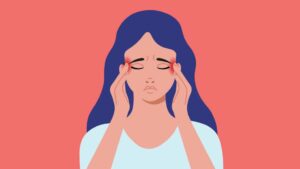 This is the very first thing you experience when you are under stress. When we get stressed, our body tenses up and the muscles in our head and neck can become very tight. This tension can lead to headaches and migraines.
This is the very first thing you experience when you are under stress. When we get stressed, our body tenses up and the muscles in our head and neck can become very tight. This tension can lead to headaches and migraines.
The physiological connection of stress to headaches is not yet clear, but it is believed that the release of stress hormones like cortisol may play a role. When our bodies experience a surge of these hormones, it can cause inflammation and lead to headaches.
If left unchecked or unmanaged, chronic stress-induced headaches can result in severe conditions like:
- Tension headaches: These are the most common type of headaches, and they are caused by muscle tension in the head and neck.
- Migraines: These are more severe than tension headaches, and they can be accompanied by symptoms like nausea, vomiting, and sensitivity to light.
- Cluster headaches: These are very severe headaches that tend to occur in groups, or clusters. They are often accompanied by a burning sensation and watery eyes.
- Stroke: This is a very serious condition that can be caused by chronic stress. A stroke occurs when the blood supply to the brain is cut off, and it can lead to paralysis, coma, and even death.
All of these can damage your health in the long run if not treated on time.
Cardiovascular problems
Also known as heart disease, cardiovascular problems are one of the most common effects of chronic stress. When we experience chronic stress, the body is in a constant state of “fight or flight” mode. This means that the body is constantly pumping out stress hormones like cortisol and adrenaline. These hormones can take a toll on the heart and vessels. While the primary effects of stress on heart disease are still being studied, the very obvious signs can include things such as chest pain, an irregular heartbeat, and high blood pressure. If left unmanaged, these have a threat of translating into serious heart conditions such as:
- Hypertension: This is when your blood pressure is chronically high.
- Atherosclerosis: This is the hardening and narrowing of arteries due to a build-up of plaque.
- Heart attacks: This is when the blood flow to your heart is blocked, usually due to a clot.
- Coronary heart disease: This is the most common type of heart disease, and it happens when plaque builds up in the coronary arteries. This can lead to chest pain, a heart attack, or even death.
- Heart failure: This occurs when the heart is unable to pump enough blood to meet the body’s needs. This can cause fatigue, shortness of breath, and fluid build-up in the legs and feet.
- Arrhythmias: These are abnormal heart rhythms that can cause dizziness, fainting, and even cardiac arrest.
All of these heart conditions are serious and can lead to death if not treated properly. That’s why it’s so important to manage stress levels and seek help if you think you might be suffering from chronic stress.
Stomach problems
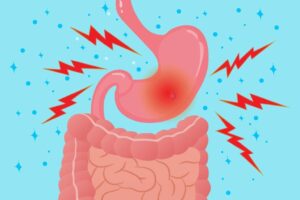 It is no surprise that stress can cause stomach problems. After all, the gut is often referred to as the “second brain” due to the fact that it is so intimately connected with the brain. When we experience chronic stress, it can lead to a number of stomach problems such as:
It is no surprise that stress can cause stomach problems. After all, the gut is often referred to as the “second brain” due to the fact that it is so intimately connected with the brain. When we experience chronic stress, it can lead to a number of stomach problems such as:
- Irritable bowel syndrome (IBS): This is a condition characterized by abdominal pain, bloating, diarrhea, and constipation.
- Indigestion: This is a general term used to describe discomfort in the stomach after eating. It can cause heartburn, nausea, and bloating.
- Acidity: This is a condition in which the stomach produces too much acid. This can lead to heartburn, indigestion, and ulcers.
- Gastroesophageal reflux disease (GERD): This is a condition in which acid from the stomach flows back up into the esophagus, causing heartburn and other symptoms.
- Ulcers: These are sores that form in the lining of the stomach or small intestine. They can be very painful and may bleed.
- Inflammatory bowel disease (IBD): This is a group of conditions that cause inflammation in the digestive tract. The two most common types are Crohn’s disease and ulcerative colitis.
All of these conditions can be very painful and cause a lot of discomforts.
Breathing problems
This may seem uncanny. However, excess stress can even impact a task as simple and crucial as breathing. This is because chronic stress can lead to a condition known as hyperventilation. Hyperventilation is when you take shallow, rapid breaths that cause you to exhale more carbon dioxide than you inhale. This can lead to a number of symptoms such as:
- Dizziness
- Lightheadedness
- Shortness of breath
- Chest pain
- Rapid heartbeat
- Tingling in the hands and feet
- Muscle spasms
Hyperventilation can also trigger panic attacks in people who suffer from anxiety disorders. If left untreated, it can even lead to fainting and loss of consciousness. That’s why it’s so important to seek help if you think you might be suffering from chronic stress.
Asthma is also a chronic condition that causes inflammation in the airways. This can make it difficult to breathe and may lead to wheezing, coughing, and shortness of breath.
Both of these conditions can be very dangerous if not treated properly. That’s why it’s important to seek help if you think you might be suffering from stress-induced breathing problems.
Excessive sweating
This is a rather embarrassing side effect of stress, but it’s a very real one nonetheless. When we experience chronic stress, our bodies go into “fight or flight” mode. This is a survival mechanism that dates back to our days as hunter-gatherers. When faced with a predator, our ancestors had two options: fight or flee.
The “fight or flight” response is characterized by the release of adrenaline and cortisol. These hormones increase heart rate and blood pressure and cause the body to release glucose for energy. They also cause the sweat glands to produce more sweat.
While this response is beneficial in short-term situations, it can be detrimental when experienced on a chronic basis. That’s because the constant production of these hormones can lead to a number of problems such as:
- Anxiety
- Insomnia
- High blood pressure
- Dysregulation of body temperature
- Poor body odor
- Hyperhidrosis (abnormally excessive sweating)
- Diabetes
- Weight gain
Excessive sweating is also a symptom of anxiety disorders and can be very embarrassing for those who suffer from it.
Skin issues
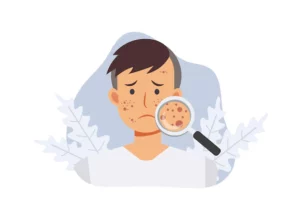 Stress can also take a toll on your skin. When we experience chronic stress, our bodies produce more of the hormone cortisol. Cortisol is known as the “stress hormone” because it helps us deal with stressful situations. However, too much cortisol can lead to a number of problems such as:
Stress can also take a toll on your skin. When we experience chronic stress, our bodies produce more of the hormone cortisol. Cortisol is known as the “stress hormone” because it helps us deal with stressful situations. However, too much cortisol can lead to a number of problems such as:
- Acne: This is a common skin condition that causes pimples, blackheads, and whiteheads.
- Eczema: This is a condition that causes the skin to become dry, itchy, and inflamed.
- Psoriasis: This is a condition that causes the skin to become red and scaly.
- Hives: This is a condition that causes the skin to become raised and itchy.
- Rashes: This is a condition that causes the skin to become red and inflamed.
- Rosacea: Rosacea is a condition that causes redness and bumps on your skin. It can also make your skin sensitive and dry.
All of these conditions can be very painful and cause a lot of discomforts. They can also be very difficult to treat.
Hair loss
This is a very unnoticed physical effect of stress but it is very common. When you are constantly under stress, your body produces high levels of the hormone cortisol. This can lead to hair loss, which usually shows up as thinning hair. However, some other effects of stress on your hair’s health can also include:
- Dandruff: When you are stressed, your body produces more oil which can lead to dandruff.
- Brittle hair: Stress can make your hair become brittle and dry. This can present itself in the form of split ends or your hair breaking more easily.
- Balding: In extreme cases, stress can actually lead to balding. This is more common in men but it can happen to women as well. This happens because of the high levels of cortisol in your body which can cause your hair follicles to shrink.
If you are experiencing any of these physical effects of stress, it is important to seek help.
Weight fluctuations
Weight and stress have a very complicated relationship. When we are stressed, our bodies produce the hormone cortisol. This hormone is responsible for a number of things, one of which is regulating our metabolism. When cortisol levels are high, our metabolism slows down and we start to store more fat. This can lead to weight gain. However, stress can also lead to weight loss. This is because when we are stressed, we often don’t have an appetite. This can lead to us not eating enough and losing weight.
Some commonly dangerous effects of stress on our weight, appetite, or food habits in general include:
- Anorexia: This is when you lose your appetite due to stress. This can lead to weight loss and malnutrition.
- Bulimia: This is when you eat a lot of food and then purge it through vomiting or use of laxatives. This can also lead to weight loss and malnutrition.
- Binge eating: This is when you eat a lot of food in a short period of time. This can lead to weight gain.
- Starvation: This is when you don’t eat enough food. This can lead to weight loss and malnutrition.
All of these effects of stress on our weight can be very dangerous and should be taken seriously
Sleep problems
 Sleep is a very natural and necessary function of our bodies. It is when we rest and heal. When we don’t get enough sleep, our bodies can’t function properly. This can lead to a number of problems such as:
Sleep is a very natural and necessary function of our bodies. It is when we rest and heal. When we don’t get enough sleep, our bodies can’t function properly. This can lead to a number of problems such as:
- Fatigue: This is when you are constantly tired and have no energy.
- Irritability: This is when you are easily annoyed and irritated.
- Anxiety: This is when you feel anxious or worried.
- Depression: This is when you feel sad or hopeless.
- Nightmares: This is when you have bad dreams.
- Insomnia: This is when you have trouble falling asleep or staying asleep.
- Hypersomnia: This is when you sleep too much.
All of these effects of stress on our sleep can be very harmful to our mental and physical health.
Sexual dysfunction
Sexual desire or libido is the want or need to have sexual activity. Libido can fluctuate due to stress. When we are stressed, our bodies produce the hormone cortisol. This hormone can interfere with other hormones in our bodies that are responsible for sexual desire. This can lead to a decrease in libido. It can also have other impacts such as:
- Erectile dysfunction: This is when a man has trouble getting or maintaining an erection.
- Premature ejaculation: This is when a man ejaculates too soon during intercourse
- Delayed ejaculation: This is when a man takes a long time to ejaculate during intercourse
- Inhibited orgasm: This is when a woman doesn’t reach orgasm even after plenty of stimulation.
- Dyspareunia: This is when women experience pain during intercourse.
All of these can cause a lot of stress and anxiety. They may even hamper a person’s sexual well-being.
Weakened immunity
Lastly, immunity is a state of being able to resist a particular disease or infection. For people with chronic stress problems, their immunity is weakened. This makes them susceptible to diseases and infections. When the body is under constant stress, it produces cortisol which suppresses the immune system. As a result, people who are constantly stressed are more likely to get sick often. This can make it difficult for them to recover from an illness or injury. Some of the most common infections that people with weakened immunity get are:
- common cold
- flu
- sinus
- infections
- pneumonia
All these may not be as major in impact. But for people with low immunity, they can be potentially life-threatening.
Ways To Manage Physical Effects Of Stress
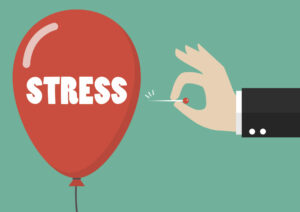 Now that we know of all the negative impacts of stress on our physical health, we will look at some ways to combat these. There are multiple ways to do this. You can either approach a professional for help or adapt to self-help. Both these can aid in managing stress. Some of the most common tools used by professionals include:
Now that we know of all the negative impacts of stress on our physical health, we will look at some ways to combat these. There are multiple ways to do this. You can either approach a professional for help or adapt to self-help. Both these can aid in managing stress. Some of the most common tools used by professionals include:
- Diagnostic lab tests
- Therapy/Counseling
- Medication
- Certain medical procedures
- Acupuncture
- Acupressure
- Aromatherapy
- Massage therapy
- Biofeedback
Similarly, there are a lot of things one can do by themselves to get rid of stress. Some of these are:
- Exercise
- Yoga
- Journaling
- Maintaining sleep hygiene
- Eating right
- Meditation
- Reducing screen time
- Progressive muscle relaxation
- Deep breathing
- Guided imagery
Stress management should be a priority for everyone. This is because of how harmful stress can be, not just mentally but physically as well. It is important to take care of yourself and find ways to destress. If you think you might be suffering from stress, it is important to reach out for help.
Conclusion
Stress is a very real problem that can have a number of negative effects on your body. These can cause problems and lead to a depreciation in the quality of life. In severe cases, they may even cause serious illnesses and disorders. It is important to seek help if you are experiencing any of these effects. Stress can be managed and there are many resources available to help you. Don’t hesitate to reach out for help if you need it.
If you or someone you know is looking for psychological help, Therapy Mantra is here for you. We are the leading providers of online therapy and counseling. Our team of highly trained and experienced therapists can provide assistance at the most affordable rates. Contact us today to learn more about our services. You may also visit our website to book an online therapy session or download our free Android or iOS app for more information.
